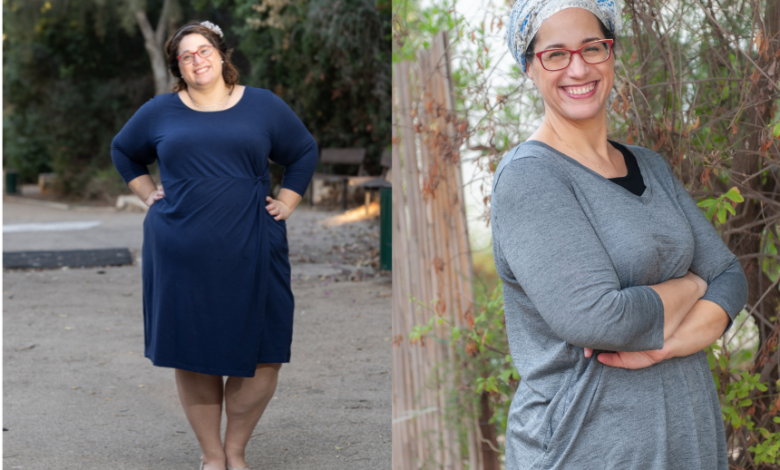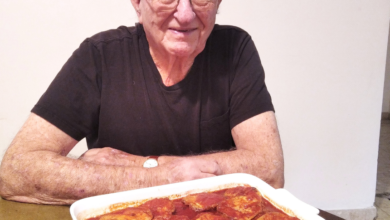
Today I am sharing an interview with Organization Expert Rebekah Saltzman, including her Weight Loss Surgery To-Do List for anyone considering taking this path. This is the second Jewish Food Hero interview on this subject.
We often assume that the only explanation for obesity is that someone is either eating too much, or moving too little – or both. New research in obesity science is finding that obesity is not simply a result of personal food choices but rather a hormonal or constitutional disorder. As investigative science and health journalist Gary Taubes writes:
“Obesity is…a disregulation of fat storage and metabolism, a disorder of fuel-partitioning…People don’t get fat because they eat too much, consuming more calories than they expend, but because the carbohydrates in their diets — both the quantity of carbohydrates and their quality — establish a hormonal milieu that fosters the accumulation of excess fat.”
Gary Taubes
I am curious about stories of female transformation, and about how women engage with food to heal and help themselves live more full lives. Surgical intervention in weight loss is often seen as taboo. Weight loss surgery is a complicated topic precisely because society simultaneously judges women for their body size, and for the methods they use to achieve it. In this interview I seek to have an intelligent conversation about this unique experience.
My goal here is to make space for people to share real stories about dietary choices and change without shame or judgment. May we all learn something from Rebekah’s experience. Please get in touch if you have a food story you’d like to share.

Introducing: Rebekah Saltzman
I met Rebakah Saltzman online and we bonded because I dream about being more organized and she is a personal organization expert who runs a 36-day organization challenge around Passover called “Painless Pesach: Clear your clutter and plan for Pesach”.
Rebekah is a sustainable lifestyle leader in the Jewish community. She is the author of Organized Jewish Life: The Essential Guide to Planning Jewish Holidays, Events and Every Day. She is passionate about helping people de-clutter and organize their environments.
A busy mother of three and an entrepreneur, Rebekah knows the struggles of keeping it all together. Pair that with the revolving Jewish calendar, managing all the customs, and everyday life – it’s easy to need tools and methods to support organization.
Using her expertise as a personal organizer, Rebekah has tackled the seemingly impossible task: making Jewish customs, traditions and holidays simple with the ultimate checklist for Jewish life. It will start making lives easier in 2023.
You can connect with Rebekah here:
Rebekah, tell us about your relationship with food and your body before the surgery?
Ever since I was a small child I struggled with my food. We always ate relatively healthily and junk food was only for treats, but nevertheless it was always in the house. I’m tall and developed early. Even though I always felt OK with that, others often perceived me as older and more mature than I really was. I acted that way in response, or tried to at least.
To my mother’s credit, she tried to help me lose weight both through diet and exercise. We tried the weight loss center at Children’s hospital, Weight Watchers, joining a gym, and a bunch of other things I can’t remember. Although I was able to lose weight each time, I just couldn’t keep it off.
These experiences led me to categorize food as good and bad. There may be truth in those categories, but what really counts is only how you manage food.
I was left with a confusing mindset. Was I bad if I had extra dessert? I remember people commenting on what I ate as a child, which often led me to eating in secret. Today, even after the surgery, I still prefer to eat alone, albeit not for the same reasons.

How did you first come across the idea of weight loss surgery, and how did you decide that this was the right choice for you?
My best friend had weight loss surgery about 10 years ago. At the time I was overweight too, but felt like surgery was a last resort. Honestly, it made me cringe, it seemed like a cop out.
However, in around 2018 my weight was ballooning and I couldn’t seem to take it off, so I gave myself an ultimatum: lose weight or do surgery.
I started following a plan to manage my hormones better in hopes that that would help. I began working out with a personal trainer. Then life got in the way, and I found everything to be too challenging. It was really hard to make different dinners and always be focusing on my cycle. I didn’t feel like I had enough support around food.
My mom got sick. I was traveling between the US and Israel and I wasn’t able to take care of myself alongside all the other people who needed me. I over-extended myself in a big way.
After my mom died in 2020, I started having issues with blood pressure and blood sugar, and I was at my highest weight. I thought I looked OK, but I felt awful. I said to myself: “I am 39 years old. I shouldn’t be having so many problems. I need to do something now.”
That’s when I made the choice to do the surgery. In Israel, in order to get the surgery covered you need to go through extensive pre-surgery tests, and sit before a panel to determine if you are a good candidate for surgery.
What were some of the considerations in your decision making process?
I have 3 teenagers and I really wanted to be able to be there for them as they got older. More than that though, I really wanted them to be able to see that sometimes you have to do difficult things, and that it’s important to get help when you need it.

When did you have your surgical procedure, and what procedure did you have?
I had a Bariatric sleeve (sleeve gastrectomy) in November 2021.
What did you do to prepare yourself emotionally and physically for the surgery?
Everything I had done over the years helped me to manage and get ready for the surgery: learning about healthy portion sizes, coaching on emotional eating, knowing about good choices around food, and how to prepare healthy food, and learning to recognize fullness.
I tried not to tell anyone I was having the surgery. I didn’t want to hear other people’s stories because there were a lot of negative ones and I didn’t want to chicken out at the last minute. I didn’t want the judgment that comes along with a choice like this, I wanted to not hear everyone else in order to be able to listen to my own voice.
In the months leading up to the surgery I started to exercise. This was super hard since I was physically uncomfortable. I set aside time daily to go for a walk, starting with 20 minutes and building up to 50. That’s it. I just walked. I didn’t try to go too fast.
This was helpful for after the surgery because it was already on my calendar, already a habit and my body was already used to moving. I had to build back up to 50 minutes but that happened fairly fast.
I made food in advance, freezing soup and apple sauce in individual portion sizes in preparation for the limited post-surgery diet, and to save me having stand and cook while recovering.
What I wish I had done beforehand is:
- focused on working out my core and building muscle;
- got a post surgery support band to help the skin not move as much;
- Made sure I had lower rise underwear so that it didn’t touch the surgery sites;
- invested in a few loose dresses for the same reason;
- bought and set up all the vitamins in advance.
Obviously this surgery has a very clear, visible, physical outcome. But how does the outward appearance affect the internal experience, and vice versa? What physical and emotional effects have you experienced?
I’m physically more comfortable, moving isn’t a struggle anymore. My health has improved and I feel better. This in turn improves my emotional state: I’m not exhausted and I can think better.
It’s a cycle – when one thing in the cycle is off it affects everything else. Now that I can move better it’s less of a struggle to get out and exercise, which improves my mental state and gives me clarity. Now that most of my health issues have been resolved, it’s easier to focus on food, healing my gut and balancing hormones.
Professionally, I notice that at half the size I was before, people can hear me better, which gives me more confidence. As sorry as I am to say this, I think that being fat limited the ability for people to take me seriously as an organizer. If I couldn’t control my weight, how could I help them get organized? Maybe that’s me projecting, but I have seen a difference in my business.

As a professional organizer, one might assume that you have always been really organized about food, or at least that you have an organized kitchen. Tell us what has changed for you in terms of organizing your eating and kitchen since having the surgery. How did you organize food and kitchen before surgery and how do you organize food and kitchen today?
My kitchen is organized. You can walk into it, and I can direct you to where everything is. Everything has a place.
When clients would ask me to do a kitchen before the surgery I would always sort of panic because it’s my least favorite room to organize. It isn’t that I’m not a competent cook, it’s that I don’t really enjoy it, especially since having kids. I can make a meal plan, but I just found it difficult to follow it. Something would come up and I would have to shift or pivot, or I would make something and it didn’t turn out OK, or the kids didn’t like it.
When my mother got sick and I was traveling between Israel and the US frequently, my husband had taken over a lot of the food responsibilities, which continued during the pandemic due to my many health issues. After my mother passed away, I decided to take food off my plate. I asked my husband to take over the weekly shopping and meal planning, and it has been a game changer for me. I tell him what I need and he helps me get it.
Asking for help was what I needed. I needed to outsource food. I realize that for some people that won’t be possible all the time or even at all, but for us it worked.
Here’s the realization that enabled me to ask for that help:
I recognized that I was stretched very thin, in the same way that my clients often are. How could I tell other people to get help with de-cluttering and organizing when I was refusing to ask for the help I needed with food?!
What have you learned about yourself going through this transformation?
I learned that taking the easy way out isn’t necessarily wrong. It’s OK to do hard things in an easier way. And surgery isn’t the easy way out, it’s the last resort. No one does it for fun, they do it because they feel like they have no other options.
I like to focus on solutions. In this case it felt like surgery was my only option. So my choices were do the surgery or don’t do the surgery. Not doing surgery felt like the wrong choice.
I learned to better distinguish fear of doing something from feeling that something was the wrong choice. Fear doesn’t always mean something is wrong, it may just be an emotional response to an important decision.
I learned I can be disciplined around food.

Tell us about the conversations you are having now about food choices and body size in your family.
My kids struggle with body size. I have three teenagers and talking to them about anything is hard. But I feel a lot less capable of talking about food.
Even before surgery we always cooked healthily and had limited junk food in the house, but portions weren’t restricted and the kitchen was open all the time. The kitchen is still open. I teach the kids to honor their hunger, but also encourage them to listen to their bodies. Are you really hungry or are you bored?
I often tell my son, who really struggles with weight, that I just don’t want him to end up in a situation like mine. This has spurred him to work out and he has been open to working with a nutritionist. He has also taken more action with his food, making his own lunches and working with us to create shopping lists. (However grudgingly!)
How have people around you responded to your choice to alter your body size?
Most people are so happy for me now that I am healthier. I haven’t gotten any negative feedback, at least not to my face! That being said, people do feel compelled to tell me how surgery didn’t work for a friend of theirs. While I find this annoying, it is a good reminder that I can’t coast and that I need to do the work and really listen to my body and my restrictions.
I have mixed feelings when people say: “You look so good”. I felt I looked good before surgery. Yes, I was fat, but that didn’t mean I didn’t feel beautiful. When someone complements my appearance now, I remind myself that I didn’t do this because I looked bad, but because I needed moving my body to be easier and to feel better. If I look good, it’s because of how I feel which energetically is more apparent than before.
Has your relationship with food changed? How?
I’m much more focused on protein now. It’s really essential after surgery, even at the cost of other nutrients. This makes me plan out my food a lot more than I did before, which is a good thing.
I think about food more, specifically in terms of timing because I need to eat every 3 hours. If I have an early start, it means I start eating earlier. So I may need to stretch out the times I eat by thirty minutes in order to still have dinner with my family.
I skip courses on Shabbat to manage the post-surgery restrictions on combining food and liquids. After having challah I need to wait before having soup, and then wait again before having the main course. It’s easier to simply skip the soup. Eating out can be complex because it means having to be on someone else’s schedule.
Overall though, knowing that most food isn’t restricted as long as I respect my stomach restriction makes me feel comfortable when things happen outside of my control, like when I eat something I wouldn’t normally eat, or when I am traveling and I don’t have all the usual options.
What wisdom/advice can you share with anyone who is considering weight loss surgery?
Get organized.
Make sure you understand exactly what will happen before, during, and after your surgery.
I wish I had known just how painful the first few weeks after surgery would be. The skin starts to get loose and that can pull on the wounds, so ask your doctor about compression bands or how to manage that. I also had great difficulty getting out of bed because my stomach muscles were so weak. The sofa or a recliner chair can be a better choice.
Here’s a checklist for all the questions you need answers to:
- What will happen on the day of the surgery?
- When should you stop eating?
- Where do you report to?
- What should you bring with you to the surgery center?
- If you take medications, will the surgery center provide them, or do you have to bring your own?
- Will you be able to take specific medications after surgery, or do you need to switch to different brands or formulations?
- Can you schedule follow up appointments for after the surgery in advance? If you can’t, at least get a list of what follow ups are expected and when they can be scheduled.
- Who should you contact in case of emergency after the surgery?
- Does the doctor have a call service?
- Will the doctor check in on you?
- What would an emergency look like?
- Are compression bands recommended?
You should also check in with the nutritionist beforehand and find out:
- The schedule for follow ups;
- Which vitamin brands they recommend;
- What the diet will be before the first visit;
- How long each stage of the diet will last.
If you are organized, prepare well, and manage recovery carefully, you can have a positive weight loss surgery experience, just like I did.




